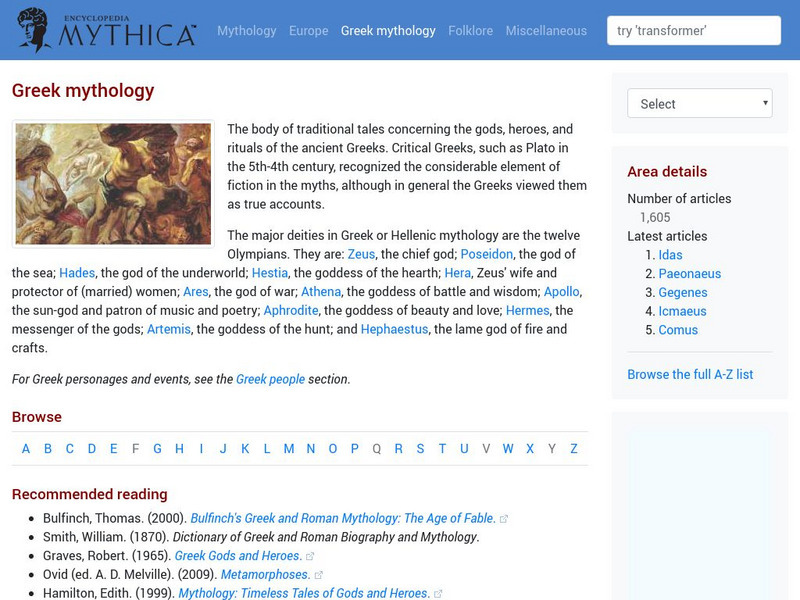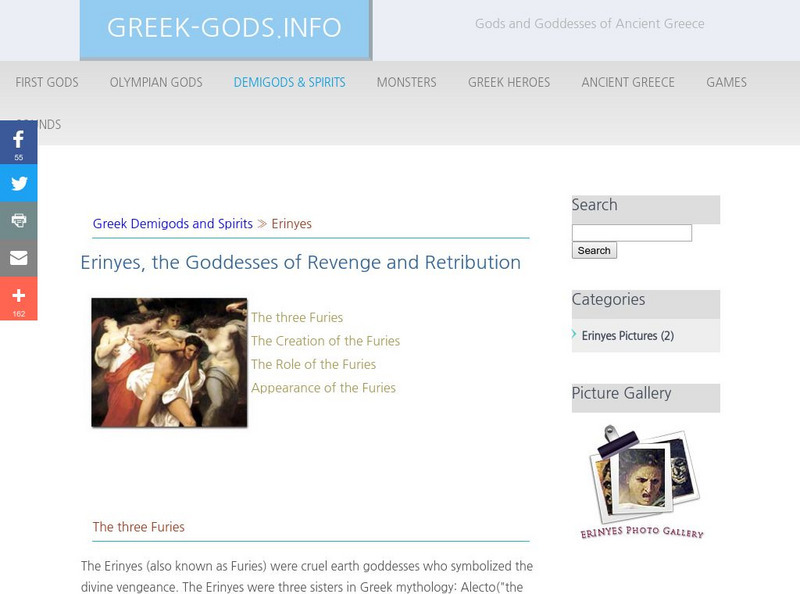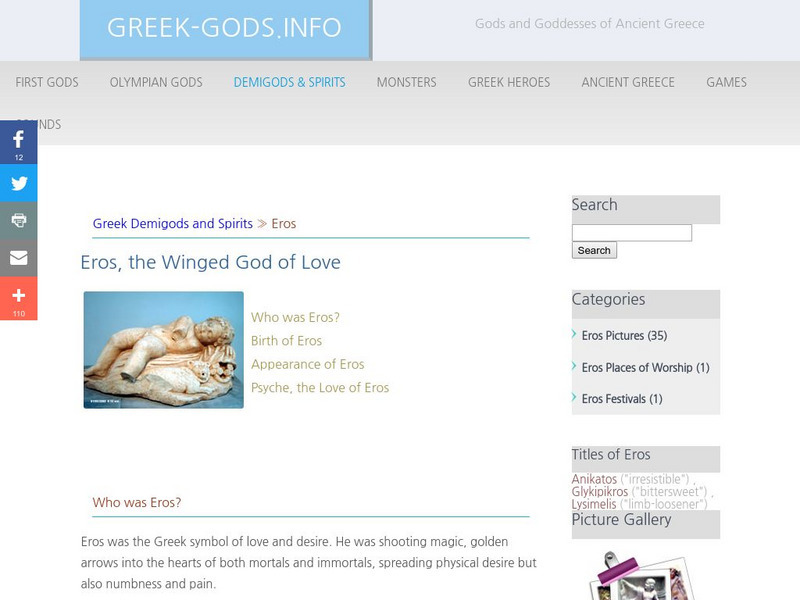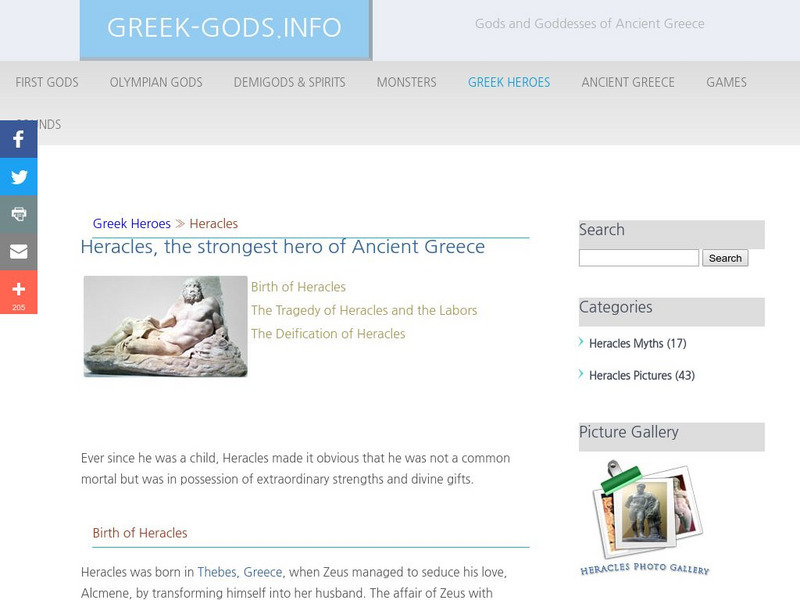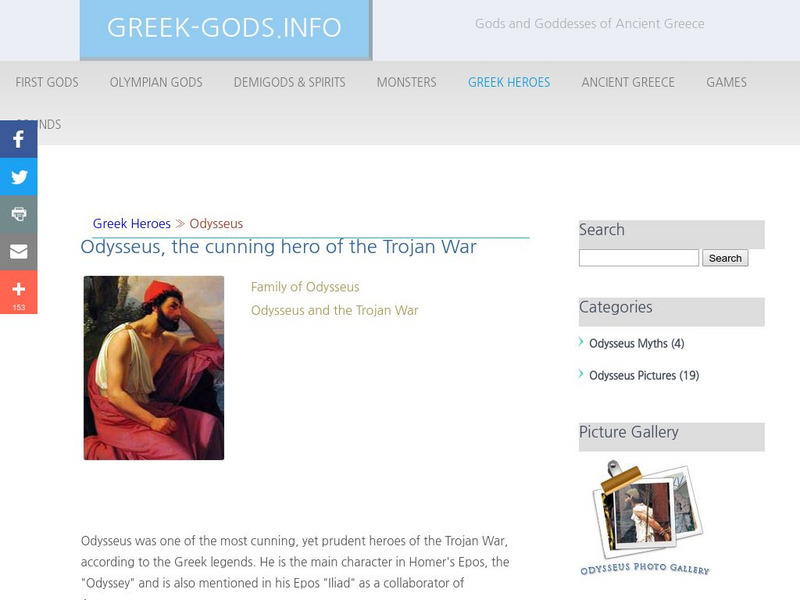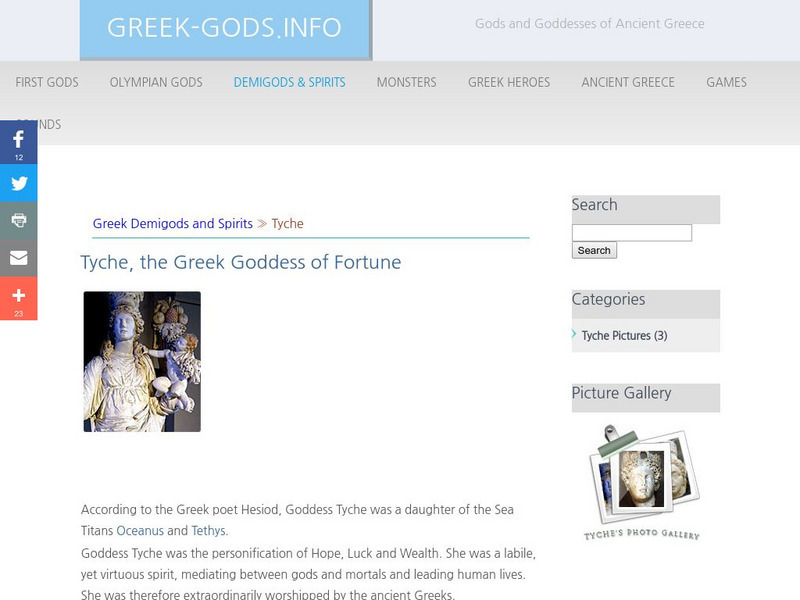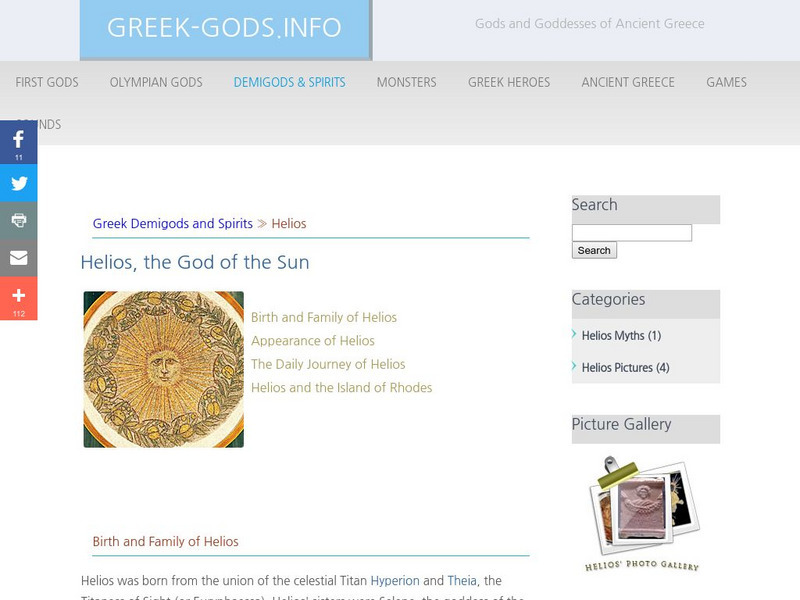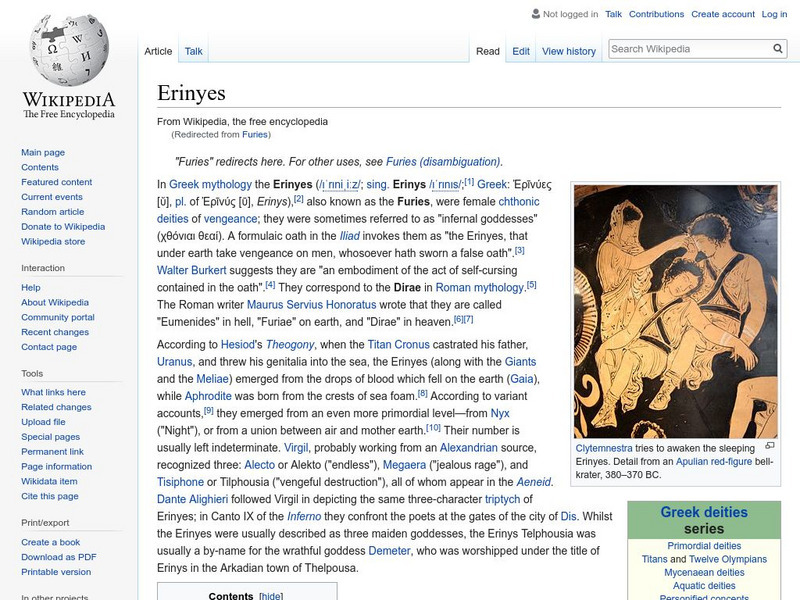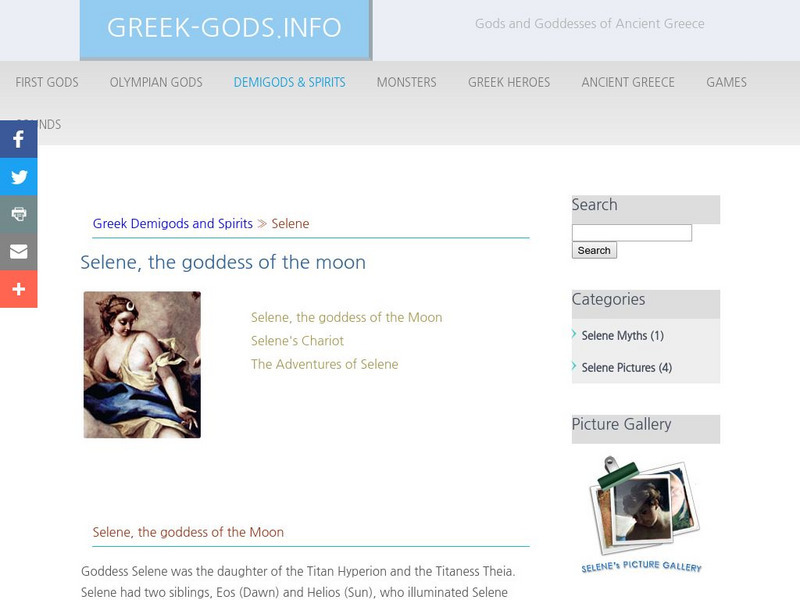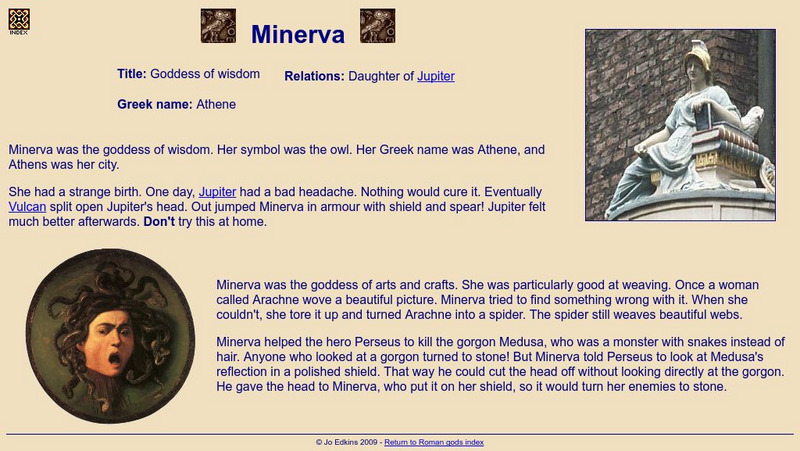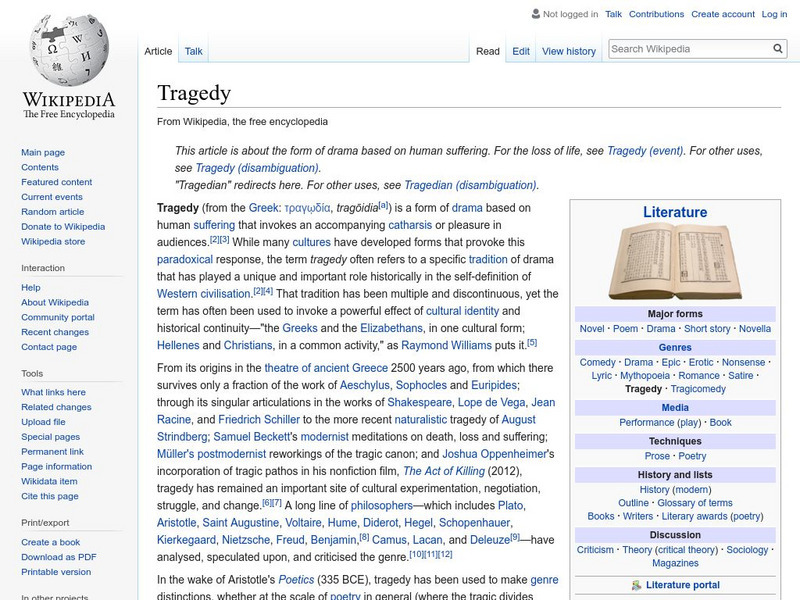Jefferson Township Schools
Major Greek Gods and Goddesses
From Poseidon (Neptune) to Aries (Mars) and Apollo, learners are given a great overview of the major Greek gods and goddesses with this resource, which includes a graphic organizer and reading excerpts on each of the gods.
Curated OER
Those Wacky Greek and Roman Gods: A Quick Cheat-Sheet
Here's a handy two-page reference that briefly identifies major Greek and Roman mythological figures.
Museum Network (UK)
Wallace Collection: Who's Who in Greek and Roman Mythology
The ABC's of the Who's Who in Greek and Roman Mythology. Learn about the Roman and Greek names, type of character, family, attributes, and other extra information.
Encyclopedia Mythica
Encyclopedia Mythica: Greek Mythology
Encyclopedia Mythica offers a comprehensive resource on Greek mythology. Content includes a look at the principal gods, Zeus's consorts and offspring, the descendants of Prometheus, and much, much more. Click on "browse articles" for a...
Greek Gods
Greek Gods: Demigods & Spirits: The Erinyes
Learn about the Erinyes (also known by the Romans as Furies), three sister goddesses of revenge and retribution. See pictures depicting their heads wreathed with serpents, burning breath, and poisonous blood was dripping from their eyes.
Greek Gods
Greek Gods: Demigods & Spirits: Eros
Eros (Cupid), the winged god of Love in Ancient Greece, shot golden arrows into the hearts of both humans and gods.
Greek Gods
Greek Gods: Greek Heroes: Heracles
This site focuses on the Greek hero Heracles including his ancestry, pictures, events in his life, and links to myths about him.
Greek Gods
Greek Gods: Greek Heroes: Odysseus
This site focuses on Odysseus including his ancestry, his participation in the Trojan War, his ten-year journey at sea, and pictures and myths about him
Greek Gods
Greek Gods: Demigods & Spirits: Tyche
Read to learn more about Tyche, the Greek goddess of fortune, chance, and the unpredictable, who was the personification of hope, luck, and wealth.
CommonLit
Common Lit: Text Sets: Mythology
This is a collection of 18 Grade-Leveled texts (6-12) on the topic of Mythology. From prehistory to the present, mythology has played an essential role in how humans interact with and understand the world around them. Explore a world of...
Greek Gods
Greek Gods: Demigods & Spirits: The Winds (Anemoi)
Read about the Winds (Anemoi), the personifications of the wind's various directions. The most important Winds were Zephyrus, Boreas, Notus and Eurus and others were Skiron, Kaikias, Apeliotis and Lips.
Greek Gods
Greek Gods: Demigods & Spirit: Helios
Read about Helios, the personification of the sunlight.
Bartleby
Bartleby.com: Bulfinch's Mythology: The Age of Fable
Bulfinch's collection of Greek and Roman myths is available here in full text format. A little known feature of this work is its sections on Eastern mythology, Northern mythology and a section on Druid religion.
Wikimedia
Wikipedia: Erinyes (Furies)
Encyclopedia article that discusses the "Erinyes or Eumenides (the Romans called them the Furies) [who] were female personifications of vengeance." Provides a summary of their role in Greek mythology, a discussion of their use in...
Encyclopedia Mythica
Encyclopedia Mythica: Hera
This site provides a quick explanation of Hera's (Roman name "Juno") role in the Olympian society. Her symbols and domain are also revealed.
Encyclopedia Mythica
Encyclopedia Mythica: Hermes
Well-written article tells of several of Hermes' (Roman name "Mercury") feats, including killing Argos.
Greek Gods
Greek Gods: Demigods & Spirits: Selene
Read about Selene, the goddess of the moon, the night and the months, and see her pictures.
Greek Gods
Greek Gods: Monsters: Satyrs
Learn about the Satyrs, half-man and half-goat mythological creatures, whose leader was Pan.
Other
Edkins Family Index Page: Minerva Goddess of Wisdom
Quick overview of Minerva - her role in Greek society, and her support of Perseus when he killed Medusa.
Wikimedia
Wikipedia: Tragedy
This encyclopedia entry from Wikipedia about tragedies discusses its Greek origins; the typical characteristics of a tragedy; and lists some examples of ancient Greek, Roman, English, and modern-day writers of tragedies.



